Please fill out the following information, and RRFC Admissions will contact you to discuss our program offerings:
Issue #205
by Liya Swift
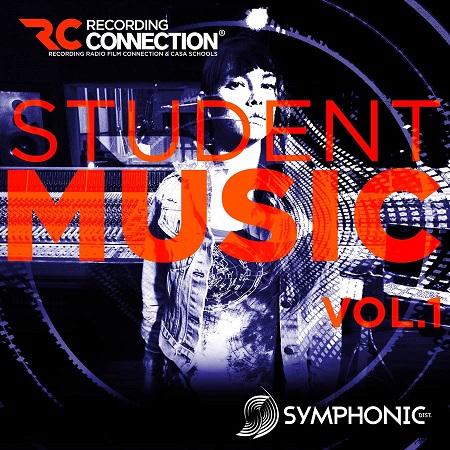 The Recording Connection Student Mixtape, VOL 1 is a project designed to provide our students with the experience of releasing their hard work for the world to hear.
Through learning with the Recording Connection, students gain an understanding of how to write, record, and mix a song from scratch. Now, students will be given the opportunity to have their music distributed across all major music streaming platforms via our awesome partnership with Symphonic Distribution!
This is a great opportunity for our apprentices to showcase their craft and the skills they’ve acquired learning inside of professional recording studios as externs and to deepen their understanding of how to use companies like Symphonic Distribution for future releases that can move their careers forward.
We’re always looking out to promote great student music. We’ll be showcasing more student talent in coming releases, so drop into our ‘Student Music Mixtape’ series… This is only VOL 1!
Stream Student Music Mixtape, VOL 1.
— by Hunter Bretting, Marketing Manager
The Recording Connection Student Mixtape, VOL 1 is a project designed to provide our students with the experience of releasing their hard work for the world to hear.
Through learning with the Recording Connection, students gain an understanding of how to write, record, and mix a song from scratch. Now, students will be given the opportunity to have their music distributed across all major music streaming platforms via our awesome partnership with Symphonic Distribution!
This is a great opportunity for our apprentices to showcase their craft and the skills they’ve acquired learning inside of professional recording studios as externs and to deepen their understanding of how to use companies like Symphonic Distribution for future releases that can move their careers forward.
We’re always looking out to promote great student music. We’ll be showcasing more student talent in coming releases, so drop into our ‘Student Music Mixtape’ series… This is only VOL 1!
Stream Student Music Mixtape, VOL 1.
— by Hunter Bretting, Marketing Manager
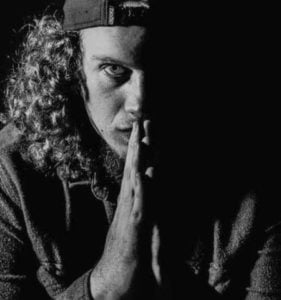 When you’re first starting out trying to build a repertoire and get a few credits under your belt just finding artists can be a challenge. Getting out to concerts, clubs, and various venues and events can definitely be a great way to meet musicians and local pros in the music industry but perhaps you can take networking a bit further the way Chris did.
Chris Locke got out into the Austin scene with a strategy for getting people’s attention and making them want to engage with him. Rather than just striking up conversations, he put his other creative talent, photography, to work.
Today he owns his own successful hip hop recording studio that’s busy 24/7.
Speaking of his strategy, Chris says, “And every single show, I would stay there [at the venue] the whole time and take everybody’s picture. And when they would come and talk to me, I would pretty much tell them, ‘Hey, this is what I actually do,’ and I would show them my studio and get them more involved with that. So the camera became like a business card to me.”
2 – GET OUT OF YOUR COMFORT ZONE
Garrett Pace (Atlanta, GA) was already a classically trained musician, opera singer, and graduate of Western Carolina University when he started Recording Connection. His mentor Nick Chahwala at
Bravo Ocean Studios (Katy Perry, T.I., Mariah Carey, Ulrika) was impressed by Garrett’s musicianship but sensed he needed to build his confidence in order to break into a music industry job.
So he challenged Garrett to get out of his comfort zone, delve deep into working in other genres and rely on his innate sensibilities and the production and engineering skills he was learning in the program.
Garrett adopted a new mindset. Nick says the change was palpable.
“He was like, ‘All right, I’m gonna get on this track, I’ve got to provide a hook. I gotta record hip hop, I gotta mix hip hop, I got to record R&B, I got to tune R&B vocals,’ says Nick. “It was really good for him.”
Seeing just how far Garrett was able to elevate his game in just a matter of months, Nick hired him on at Bravo Ocean Studios. Garrett’s advice to those who are hungry to work: “Don’t give up. Ride it until the end.”
3 – GET INTO THE STUDIO AS MUCH AS YOU CAN
When you’re first starting out trying to build a repertoire and get a few credits under your belt just finding artists can be a challenge. Getting out to concerts, clubs, and various venues and events can definitely be a great way to meet musicians and local pros in the music industry but perhaps you can take networking a bit further the way Chris did.
Chris Locke got out into the Austin scene with a strategy for getting people’s attention and making them want to engage with him. Rather than just striking up conversations, he put his other creative talent, photography, to work.
Today he owns his own successful hip hop recording studio that’s busy 24/7.
Speaking of his strategy, Chris says, “And every single show, I would stay there [at the venue] the whole time and take everybody’s picture. And when they would come and talk to me, I would pretty much tell them, ‘Hey, this is what I actually do,’ and I would show them my studio and get them more involved with that. So the camera became like a business card to me.”
2 – GET OUT OF YOUR COMFORT ZONE
Garrett Pace (Atlanta, GA) was already a classically trained musician, opera singer, and graduate of Western Carolina University when he started Recording Connection. His mentor Nick Chahwala at
Bravo Ocean Studios (Katy Perry, T.I., Mariah Carey, Ulrika) was impressed by Garrett’s musicianship but sensed he needed to build his confidence in order to break into a music industry job.
So he challenged Garrett to get out of his comfort zone, delve deep into working in other genres and rely on his innate sensibilities and the production and engineering skills he was learning in the program.
Garrett adopted a new mindset. Nick says the change was palpable.
“He was like, ‘All right, I’m gonna get on this track, I’ve got to provide a hook. I gotta record hip hop, I gotta mix hip hop, I got to record R&B, I got to tune R&B vocals,’ says Nick. “It was really good for him.”
Seeing just how far Garrett was able to elevate his game in just a matter of months, Nick hired him on at Bravo Ocean Studios. Garrett’s advice to those who are hungry to work: “Don’t give up. Ride it until the end.”
3 – GET INTO THE STUDIO AS MUCH AS YOU CAN
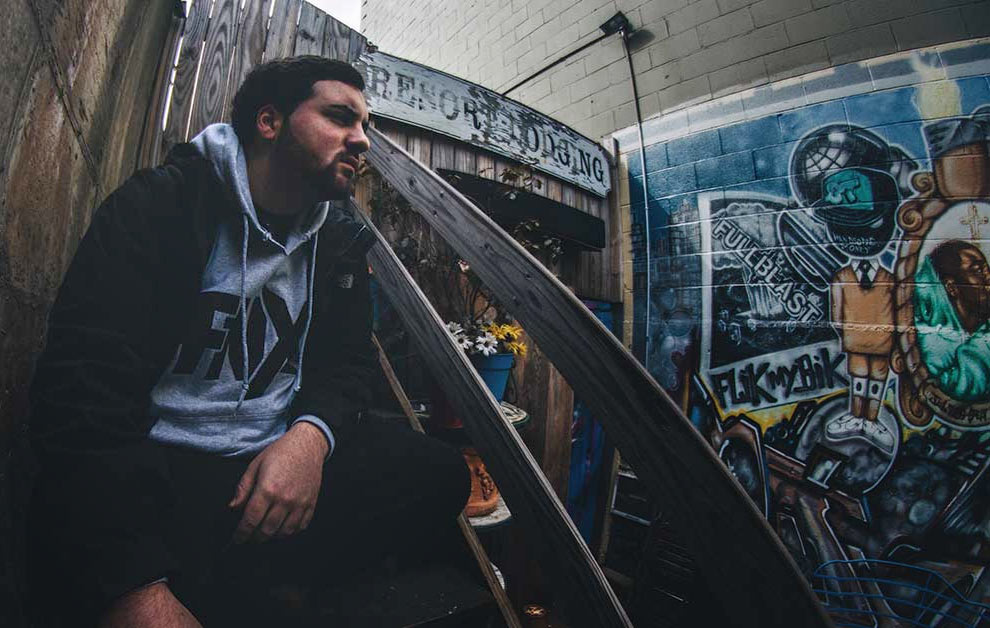 Recording Connection graduate Billy Gardella got hired at Factory Underground in Norwalk, CT, the studio where he did his externship.
How’d he do it? He came into the studio as much as he could and showed his mentor and the other engineers that he was serious about the work.
“Anything that I could do to get my foot more into the door, I did. And it paid off… coming here even when I was working another job, the restaurant job that I had. I was either coming here before or after my shifts…I did everything that I possibly could do.”
Initially hired on as an assistant engineer, Billy has since been promoted to staff engineer at Factory.
4 – USE YOUR SMARTS, GET YOUR HANDS DIRTY
April Edwards was a Recording Connection student when she noticed the recording studio where she was apprenticing wasn’t monetizing as best as they could. Revenue for a number of rehearsal rooms wasn’t being collected and various business opportunities were going unrealized.
Recording Connection graduate Billy Gardella got hired at Factory Underground in Norwalk, CT, the studio where he did his externship.
How’d he do it? He came into the studio as much as he could and showed his mentor and the other engineers that he was serious about the work.
“Anything that I could do to get my foot more into the door, I did. And it paid off… coming here even when I was working another job, the restaurant job that I had. I was either coming here before or after my shifts…I did everything that I possibly could do.”
Initially hired on as an assistant engineer, Billy has since been promoted to staff engineer at Factory.
4 – USE YOUR SMARTS, GET YOUR HANDS DIRTY
April Edwards was a Recording Connection student when she noticed the recording studio where she was apprenticing wasn’t monetizing as best as they could. Revenue for a number of rehearsal rooms wasn’t being collected and various business opportunities were going unrealized.
 April landed her music job by taking initiative. She put her business skills to use while she also developed her skills separately as an audio engineer. The studio owner gave her 30 days to put her business sense to work and April proved she was up to the challenge.
Today, April is the acting manager and lead engineer at Nitrosonic Music in Lexington, Kentucky. Recent projects include cowpunk band Hillbilly Alarm Clock and the garage rock Nine Pound Hammer. A vocalist and songwriter in her own right, she’s also getting back into her own music.
“You can’t rely on anyone else to do it for you. That’s the whole reason I started the program. I was tired of waiting for other people to record my music. You want something done you want it done right, you do it yourself. You can’t get anything done by sitting around hoping or talking about it.
Get your hands dirty. Be in a session, setting the mics up and doing your sound checks. Get in there and do it, don’t just watch. I could read the textbook all day and there’s valuable, golden information in there but I didn’t learn until I actually got in the studio and started doing it myself.”
5 – ONCE YOU’RE HIRED, STAY HUMBLE AND WORK HARD, REALLY HARD
April landed her music job by taking initiative. She put her business skills to use while she also developed her skills separately as an audio engineer. The studio owner gave her 30 days to put her business sense to work and April proved she was up to the challenge.
Today, April is the acting manager and lead engineer at Nitrosonic Music in Lexington, Kentucky. Recent projects include cowpunk band Hillbilly Alarm Clock and the garage rock Nine Pound Hammer. A vocalist and songwriter in her own right, she’s also getting back into her own music.
“You can’t rely on anyone else to do it for you. That’s the whole reason I started the program. I was tired of waiting for other people to record my music. You want something done you want it done right, you do it yourself. You can’t get anything done by sitting around hoping or talking about it.
Get your hands dirty. Be in a session, setting the mics up and doing your sound checks. Get in there and do it, don’t just watch. I could read the textbook all day and there’s valuable, golden information in there but I didn’t learn until I actually got in the studio and started doing it myself.”
5 – ONCE YOU’RE HIRED, STAY HUMBLE AND WORK HARD, REALLY HARD
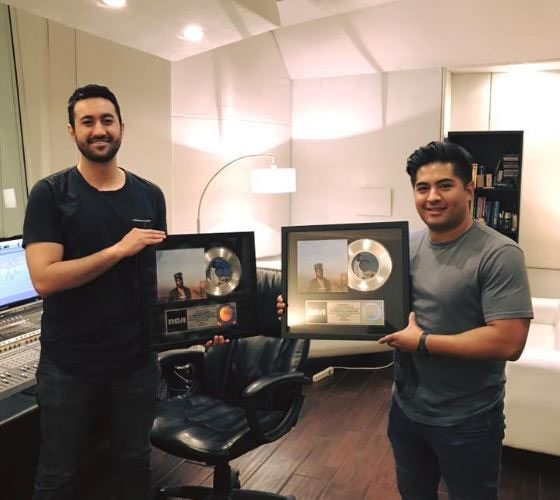
RC grad Orlando Gómez left, mentor Alfredo right
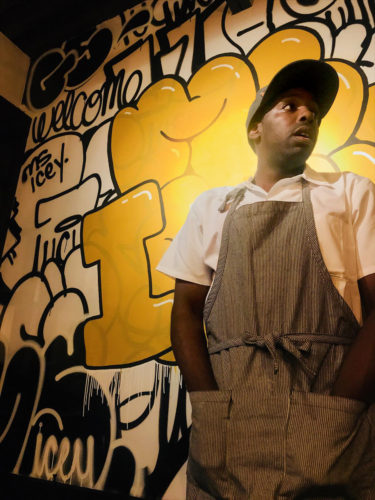 Prior to landing the position of sous chef at Negril Village, an upscale Caribbean American restaurant in Atlanta, GA, Chef Yusef Walker rose through the ranks of the brigade system, cooking in restaurants throughout New York. Besides Negril and the work he does as a CASA mentor, he’s currently in the process of creating and testing the menu for the up-and-coming Miss Icey’s. Named in honor of his grandmother, the restaurant will feature contemporary Caribbean leaning urban cuisine occurring within a street vibe aesthetic.
We recently caught up with the busy chef to learn more about what he does, garner a few insights on cooking at the professional level, and find out which qualities he looks for in the CASA students he trains.
RRFC: What do you see as one of the main shortcomings with conventional culinary school?
I’m not going to say any names, but I’ve had a lot of people come out of certain culinary institutions where they learned braising through a recipe. The recipe says that they’re going to do ratatouille which is a great dish. Then they [think] braising is synonymous with ratatouille.
And if I tell them ‘I want you to braise this cauliflower and turkey neck,” …I’ve literally had someone tell me, “You can’t braise a turkey neck.”…It kind of boxes in their brain into thinking there’s just one way to do something instead of having it technique and application based.
Then you get people afraid to break out of these confinements of what a dish should be because they haven’t thought outside the box…if I tell you “I want a matchstick cut on these apples” because I want them to look a certain way and [to have the eater] feel the texture of the ingredient in the mouth because it makes the dish better…If you can’t break out of the constraints of systematic knife cuts, then you really can’t grow, because you’re not thinking of the plate and the food and the experience inside the place where you’re cooking. You’re mostly just going by the book and turning into a cookie-cutter chef.
RRFC: What does your role as a sous chef involve day-to-day?
In addition to knowing every station on the line, because when you’re interviewing the new hires or when you’re training them, you have to be able to tell them what’s right from wrong and you’ve got to know that station like the back of your hand. You’ve got to be able to literally coach everyone through every process. You have to be able to make all the sauces, all the dressings. After the 1990’s it turned into a managerial role where you’re scheduling, where you’ve got to be a little bit of a plumber, an electrician, a mechanic, a psychologist, a guidance counselor, a bookkeeper. You’ve got to know pretty much a little bit of everything…You’ve just got to be able to keep everyone on track, everyone in line, and everything up to standard.
RRFC: So testing recipes sounds pretty involved. Could you explain what you’re doing?
You’ve got to really be a geek about it and a nerd. It’s really not what they show you on Food Network….So what I’ve learned when making my recipes is that you have to adjust your recipes into weight measures instead of volume measures because volume measures are not accurate, products are not always consistent, especially if you’re doing things that are seasonal, and especially if you have staples on your menu.
Like one of our menu’s staples is oxtail, and the price of garlic is going to go up and down, and the potency of garlic is going to go up and down as the seasons change…So weight measures are way more consistent than actual volume measures. If you’re using cups, then you’re obviously not pricing right, and if you’re not pricing right, your recipe is not right.
So another thing I learned from experience is [to] make square measurements for your recipes. I don’t necessarily mean square as in multiples of two, but square as in, like, a “one and done” type method. So our rice and peas for example, we played with the recipe until we got to use an entire number 10 can of coconut milk…then you don’t have to worry about things like, constantly having to tell somebody, “Hey, take that can of coconut milk, pour it into a quart container, label it, date it, and store it in the refrigerator,”…[Because] the recipes and the food definitely influence the behavior in your kitchen as well.
RRFC: To take things a bit further, why is it so important to be so exacting about all this stuff?
It’s important to be exacting so that you’re not ordering short, you’re not ordering over, so that the restaurant as a whole is making money and also ease of replication. You want people to be able to replicate it as a whole.
RRFC: Based on what you said earlier, it sounds like you’re not a big fan of the Food Network. Could you tell us why?
Food Network makes it seem more about the cool hair and the cool shoes and all the tattoos and big beards and stuff like that, but at the same time you get these kids who go into culinary school now that have completely have no concept of fundamentals…
You’re out of the game if you can’t replicate a consistent product and a reviewer comes in and gives you a really [bad] review, and then people are not coming to your restaurant.
RRFC: What qualities are you looking for in potential apprentices?
Just one–enthusiasm. So if you have the drive and a love of art, like art as a whole. If you like art, then you’re going to do well. You have to know how to work…Also someone who knows how to clean up, look presentable, put out quality product, quality work, and take pride in their job. That’s just to start. Everything else you can mold and bring out different qualities and characteristics in people that they may either be trying to bring out, or some that they don’t even know that they have. Learn more about CASA.
RRFC: Your current CASA extern Gregory Wesolowski, how’s he shaping up?
Greg? He’s a hunter. He lives in the country in Georgia and he knows how to break down whole animals. So I see his food coming out crazily rustic, but pretty. And it’s going to be dope. I already know his trajectory is ridiculous.
Prior to landing the position of sous chef at Negril Village, an upscale Caribbean American restaurant in Atlanta, GA, Chef Yusef Walker rose through the ranks of the brigade system, cooking in restaurants throughout New York. Besides Negril and the work he does as a CASA mentor, he’s currently in the process of creating and testing the menu for the up-and-coming Miss Icey’s. Named in honor of his grandmother, the restaurant will feature contemporary Caribbean leaning urban cuisine occurring within a street vibe aesthetic.
We recently caught up with the busy chef to learn more about what he does, garner a few insights on cooking at the professional level, and find out which qualities he looks for in the CASA students he trains.
RRFC: What do you see as one of the main shortcomings with conventional culinary school?
I’m not going to say any names, but I’ve had a lot of people come out of certain culinary institutions where they learned braising through a recipe. The recipe says that they’re going to do ratatouille which is a great dish. Then they [think] braising is synonymous with ratatouille.
And if I tell them ‘I want you to braise this cauliflower and turkey neck,” …I’ve literally had someone tell me, “You can’t braise a turkey neck.”…It kind of boxes in their brain into thinking there’s just one way to do something instead of having it technique and application based.
Then you get people afraid to break out of these confinements of what a dish should be because they haven’t thought outside the box…if I tell you “I want a matchstick cut on these apples” because I want them to look a certain way and [to have the eater] feel the texture of the ingredient in the mouth because it makes the dish better…If you can’t break out of the constraints of systematic knife cuts, then you really can’t grow, because you’re not thinking of the plate and the food and the experience inside the place where you’re cooking. You’re mostly just going by the book and turning into a cookie-cutter chef.
RRFC: What does your role as a sous chef involve day-to-day?
In addition to knowing every station on the line, because when you’re interviewing the new hires or when you’re training them, you have to be able to tell them what’s right from wrong and you’ve got to know that station like the back of your hand. You’ve got to be able to literally coach everyone through every process. You have to be able to make all the sauces, all the dressings. After the 1990’s it turned into a managerial role where you’re scheduling, where you’ve got to be a little bit of a plumber, an electrician, a mechanic, a psychologist, a guidance counselor, a bookkeeper. You’ve got to know pretty much a little bit of everything…You’ve just got to be able to keep everyone on track, everyone in line, and everything up to standard.
RRFC: So testing recipes sounds pretty involved. Could you explain what you’re doing?
You’ve got to really be a geek about it and a nerd. It’s really not what they show you on Food Network….So what I’ve learned when making my recipes is that you have to adjust your recipes into weight measures instead of volume measures because volume measures are not accurate, products are not always consistent, especially if you’re doing things that are seasonal, and especially if you have staples on your menu.
Like one of our menu’s staples is oxtail, and the price of garlic is going to go up and down, and the potency of garlic is going to go up and down as the seasons change…So weight measures are way more consistent than actual volume measures. If you’re using cups, then you’re obviously not pricing right, and if you’re not pricing right, your recipe is not right.
So another thing I learned from experience is [to] make square measurements for your recipes. I don’t necessarily mean square as in multiples of two, but square as in, like, a “one and done” type method. So our rice and peas for example, we played with the recipe until we got to use an entire number 10 can of coconut milk…then you don’t have to worry about things like, constantly having to tell somebody, “Hey, take that can of coconut milk, pour it into a quart container, label it, date it, and store it in the refrigerator,”…[Because] the recipes and the food definitely influence the behavior in your kitchen as well.
RRFC: To take things a bit further, why is it so important to be so exacting about all this stuff?
It’s important to be exacting so that you’re not ordering short, you’re not ordering over, so that the restaurant as a whole is making money and also ease of replication. You want people to be able to replicate it as a whole.
RRFC: Based on what you said earlier, it sounds like you’re not a big fan of the Food Network. Could you tell us why?
Food Network makes it seem more about the cool hair and the cool shoes and all the tattoos and big beards and stuff like that, but at the same time you get these kids who go into culinary school now that have completely have no concept of fundamentals…
You’re out of the game if you can’t replicate a consistent product and a reviewer comes in and gives you a really [bad] review, and then people are not coming to your restaurant.
RRFC: What qualities are you looking for in potential apprentices?
Just one–enthusiasm. So if you have the drive and a love of art, like art as a whole. If you like art, then you’re going to do well. You have to know how to work…Also someone who knows how to clean up, look presentable, put out quality product, quality work, and take pride in their job. That’s just to start. Everything else you can mold and bring out different qualities and characteristics in people that they may either be trying to bring out, or some that they don’t even know that they have. Learn more about CASA.
RRFC: Your current CASA extern Gregory Wesolowski, how’s he shaping up?
Greg? He’s a hunter. He lives in the country in Georgia and he knows how to break down whole animals. So I see his food coming out crazily rustic, but pretty. And it’s going to be dope. I already know his trajectory is ridiculous.
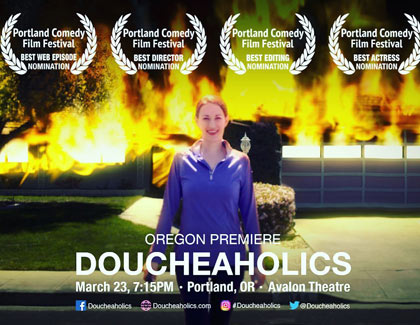 We’re happy to announce Doucheaholics is still going strong. This time it’s showing as an official selection of the Portland Comedy Film Festival where we’re sure it’ll be bringing the house down with lots of laughs.
Mentor Sean McCarthy of Guerilla Wanderers (SF Bay Area) touched base with a lowdown on the Film Connection students who have helped the digital web-series come to light:
Eric Whitehead worked on promo trailers and producing behind the scenes. Eric produced the event video with Alex which covers the premiere.
Alex Geranios worked on production on set, as well as assistant editor in post-production. Alex also produced & edited over 35+ spots & promotional materials for Doucheaholics.
Nika Finch is working on social media and was a PA on behind the scenes for “Laura,” as well as editing intern for “Laura” and other promos.
We’re happy to announce Doucheaholics is still going strong. This time it’s showing as an official selection of the Portland Comedy Film Festival where we’re sure it’ll be bringing the house down with lots of laughs.
Mentor Sean McCarthy of Guerilla Wanderers (SF Bay Area) touched base with a lowdown on the Film Connection students who have helped the digital web-series come to light:
Eric Whitehead worked on promo trailers and producing behind the scenes. Eric produced the event video with Alex which covers the premiere.
Alex Geranios worked on production on set, as well as assistant editor in post-production. Alex also produced & edited over 35+ spots & promotional materials for Doucheaholics.
Nika Finch is working on social media and was a PA on behind the scenes for “Laura,” as well as editing intern for “Laura” and other promos.
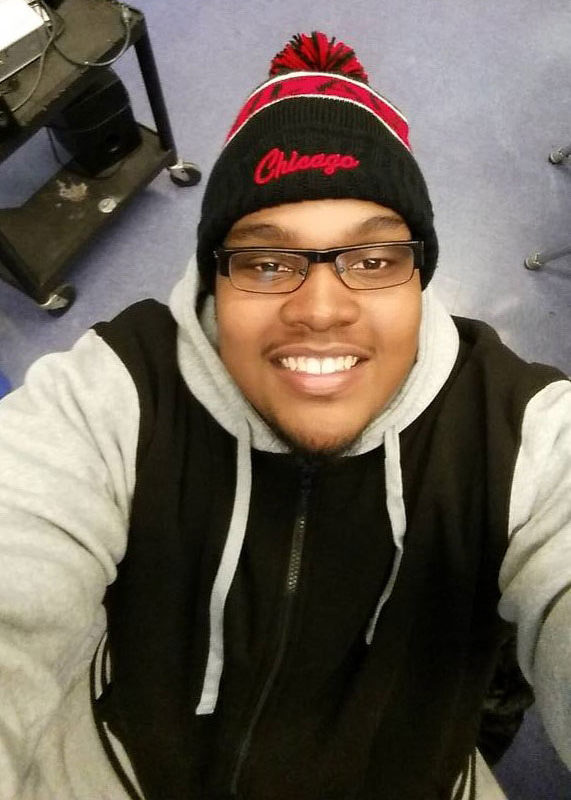 Derrick Turnage who externs with Pat Wimp of Digital Hydra (Chicago, IL) is jazzed to be staying busy and growing his skills with Film Connection:
“I’m very, very pleased with this week because though I just finished shooting my short film I had a chance to drive to Rosemont, IL and help out my mentor and his friend on a shoot for a non-profit organization. I was able to be in a beautiful hotel with great staff and met some of the great people from the non-profit organization. I was also able to learn some tips on lighting, setting up equipment, and tips on creating content for my YouTube channel.”
Derrick Turnage who externs with Pat Wimp of Digital Hydra (Chicago, IL) is jazzed to be staying busy and growing his skills with Film Connection:
“I’m very, very pleased with this week because though I just finished shooting my short film I had a chance to drive to Rosemont, IL and help out my mentor and his friend on a shoot for a non-profit organization. I was able to be in a beautiful hotel with great staff and met some of the great people from the non-profit organization. I was also able to learn some tips on lighting, setting up equipment, and tips on creating content for my YouTube channel.”

RRFC is education upgraded for the 21st century.
Get the latest career advice, insider production tips, and more!
Please fill out the following information, and RRFC Admissions will contact you to discuss our program offerings:
Stay in the Loop: Subscribe for RRFC news & updates!
© 2025 Recording Radio Film Connection & CASA Schools. All Rights Reserved.


